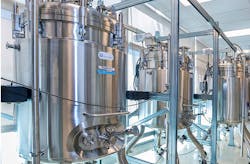Scientists and engineers at U.S. national labs are exploring the coronavirus and ways to speed development of possible diagnostics, vaccines and treatments. At the U.S. Department of Energy’s Lawrence Berkeley National Laboratory (Berkeley Lab), for example, some unique capabilities and facilities are being called into action quickly to assist in the national COVID-19 response.
Among the high-tech tools being used:
● The Advanced Light Source (ALS) and Molecular Foundry are carrying out approved essential research that may help develop therapeutics to combat COVID-19. It recently began operating a limited number of scientific instruments known as beamlines for three days a week to accommodate several academic and industry user groups. These groups are pursuing structural biology work on non-infectious protein components of the coronavirus that causes COVID-19.
● A Stanford-based group is working with Berkeley Lab’s Molecular Foundry staff to synthesize peptidomimetic polymers, or peptoids. These materials coudl serve as packages for antiviral agents, or as antiviral agents themselves.
● The National Energy Research Scientific Computing Center (NERSC) and the Energy Sciences Network (ESnet) are contributing resources to the COVID-19 High Performance Computing Consortium. ESnet, for example, will commit high-bandwidth access to its supercomputer centers like NERSC for research efforts. It has already set up dedicated queues running COVID-19-related research projects on Cori, a Cray XC40 supercomputer that can perform nearly 30 quadrillion calculations per second.
● The Advanced Biofuels and Bioproducts Process Development Unit is supporting an undisclosed company in scaling up its efforts to make a coronavirus antiviral drug.
● The Joint Genome Institute (JGI) has some its experts in high-throughput automation developing a robotic testing lab.
● The Agile BioFoundry, with its expertise in all aspects of engineering and optimizing metabolic pathways in a range of organisms, will be helping to develop new therapeutics and diagnostics.
About the Author
Stephen Mraz
Steve serves as Senior Editor of Machine Design. He has 23 years of service and has a B.S. Biomedical Engineering from Steve was a Flight officer in the U.S. Navy. He is currently responsible for areas such as aerospace and medical.

Leaders relevant to this article:

